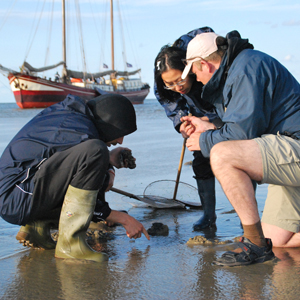NCK Summer School 2024

1797 AH, Netherlands
The bi-annual summer school of the Netherlands Centre for Coastal Research (NCK) has the objective to provide young engineers and scientists, specializing in coastal and estuarine processes with a common background in knowledge, tools and skills. In 2024, the next edition of the Summer School will take place. Registration is open.
Scope
The NCK Summer School covers a range of physical and ecological topics in the coastal area. As a central theme, it links these topics to the Dutch Wadden Sea area and its surroundings, i.e. including the barrier islands and the North Sea.
Target group
The NCK Summer School is open for all NCK PhD-students and young staff members of the non-academic NCK-partners. Moreover, we aim at participation of other organizations with interest in the NCK-curriculum.
Because of the intensity of the programme and available accommodation, the total number of participants is limited to 24. In case of more than 24 applications, the organizers will make a selection based on criteria to be decided upon in cooperation with the NCK Programme Committee.
Coastal zone management case studies
Safety against flooding in an optimal combination with other coastal functions like nature, recreation and sustainable economic activities, is the principal objective of coastal zone management. This general notion has been specified in the law (Waterwet, 2009), in EU Directives (Birds- and Habitat Directive, Water Framework Directive and Marine Strategy Framework Directive) and policy documents. The Nationaal Waterplan (2009) has introduced the slogan “The Netherlands, a safe and liveable delta, now and in the future”, which has been elaborated into the Deltaprogramme-2015 aiming at improvement of safety conditions on the short (until 2015), medium (2015-2050) and long term (> 2050).
Considering the Wadden Sea, issues in the Delta-programme and in coastal zone management may be divided into two coherent subjects: management of the island coasts and management of the Wadden Sea basins. From these subjects several topics will be selected to be analysed in groups consisting of four to five participants.
Example topics are:
- How do nourishments affect nearshore morphology and hydrodynamics? What is the effect on the coastline position and on safety?
- Which might be the effects on probability of dune breaching and on dune development in case of a general of a reduction in nourishment frequency?
- What is the effect of large scale developments in the outer delta on the adjacent coast?
- What is the role of fine sediments in defining morphological and ecological characteristics of the Wadden Sea?
- Is it possible to preserve or (re)create valuable salt marshes under conditions of a changing climate?
- What is the magnitude and quality of sediment exchange between the North Sea and the Wadden Sea?
These topics will be related to specific case studies to be analysed by the participants during the summer school. NCK-postdocs will supervise the work on the case studies. On the last day of the summer school each group will present their results.
Other activities
All participants will get the opportunity to gain some practice in field measurements, including an introduction to different measurement techniques. In addition to the course lectures and case studies, the course includes dedicated lectures and field trips to enhance the participant’s understanding of the Wadden Sea physical and eco-system and its management issues, such as gas mining and shell-fish fisheries. All participants are expected to present their own research through a poster. A poster session has been scheduled in the second week of the summer school.
Registration
The NCK summer school is organised in close cooperation with PAO foundation. To register for the summer school, visit the PAO website.










